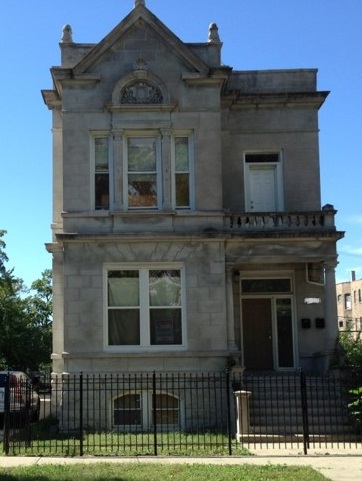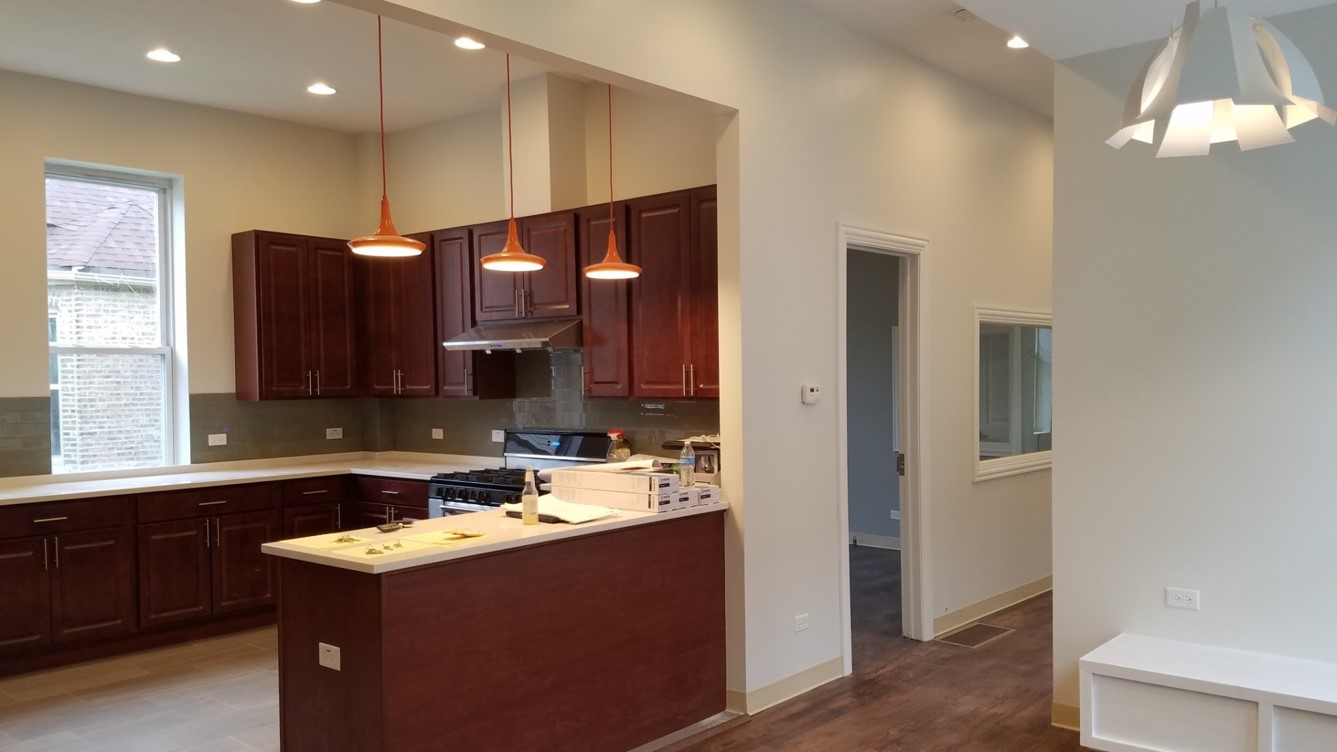
Exterior of Phoenix Hall in the North Lawndale neighborhood.
Photo Credits: Jenny Merritt
Homelessness and housing instability greatly impacts a student’s ability to stay in school and achieve educational goals. The urgency of this problem motivated The Night Ministry to partner with three other local organizations to launch Phoenix Hall last year. Phoenix Hall is an innovative new residence for high school students experiencing housing instability in the North Lawndale neighborhood of Chicago. It is one of the first housing programs in the country, and the first in Chicago, designed to improve educational outcomes by providing housing for homeless students of a specific high school.
As homelessness remains a complex issue facing communities throughout the country, schools have become uniquely positioned to identify the emerging needs of struggling families. The number of children and youth experiencing homelessness nationwide more than doubled between 2006 and 2013, when 1.3 million public school students were identified as homeless.1 In Chicago, more than 20,000 students were identified as in need of housing during the 2014-15 school year.2
Students who lack stable housing face challenges attending school regularly, completing homework, keeping up academically, and graduating. A nationwide survey of students struggling with housing instability showed that 42 percent dropped out at least once,3 and recent research has shown that young adults without a high school diploma were 4.5 times more likely to experience homelessness, emphasizing the importance of education as a protective factor from homelessness later in life as youth transition into adulthood4.
When faculty at North Lawndale College Preparatory High School recognized that seven to 10 percent of its students were experiencing housing instability,5 they felt the need to identify a long-term solution. Over the years, compassionate teachers, coaches, and administrators had been taking students into their homes when able, but a sustainable and scalable solution was needed. Community partners came together to develop an innovative initiative that could both provide support to families in crisis, as well as provide safety-net housing to students most in need and in danger of dropping out simply because of an unstable living situation.
This initiative is truly a result of collaboration and partnership. The Night Ministry is a recognized leader in Chicago, providing a continuum of housing for youth ages 14-24, and the lead in the design and implementation of this program. Our partner, Youth Outreach Services, immediately began offering case management within the school to students identified as in need, as well as their families. Our funding partner, Empower to Succeed (an independent nonprofit of Old St. Patrick’s Church), raised funds for the initial operating funds and renovation of the residence which became Phoenix Hall. Meanwhile, North Lawndale College Prep provided vision and student leaders to help us understand the need and inform the process along the way.

Phoenix Hall’s renovated kitchen area.
Photo Credits: Jenny Merritt
After two years of planning, engagement in the school and community, and renovation of a nearby single-family home in the neighborhood, Phoenix Hall opened in August 2017, ready to house up to eight students at a time. Staffed 24 hours each day by professional Resident Assistants and providing a family-like atmosphere with bedrooms, living space, meals, and study space, Phoenix Hall is one of the only programs of this kind, and the first in Chicago, where housing supports are provided for students of a particular school, with the goal of supporting and improving their educational outcomes through housing stabilization.
Around the country, a handful of programs exist to support students struggling with housing instability. Most use a host home model, where families act as temporary foster home placements to a student while they remain enrolled in their school of origin. These programs generally work across school districts in more suburban or rural areas. Other programs work with homeless youth who have already dropped out of school, helping them to reconnect to education after stabilizing their housing. Phoenix Hall works differently by stabilizing housing before education is disrupted, therefore enabling academic outcomes to be strengthened as a direct result of the housing intervention.
Each family we work with at Phoenix Hall is different. Some families are experiencing homelessness themselves and are living in overcrowded, doubled up situations very far away, and want their child to remain enrolled as a student at North Lawndale College Prep in order to ensure their education is uninterrupted. Some families have strained and tenuous relationships, and we can provide temporary respite to prevent a runaway or lockout situation. In this way, Phoenix Hall becomes a housing alternative while we work with the entire family to address the dynamics that led to the strained relationships as we work towards a successful reunification.
A few family relationships are very fractured due to incarceration of a parent or other serious issues such as mental illness or substance abuse, and we are working to prevent the young person from falling into system care. In rare cases, we have seen temporary emergency situations, such as a family becoming displaced due to fire, and a student needing temporary placement so that education is not disrupted while the family seeks relocation. In all instances, Phoenix Hall provides support and relief for the family while they work to become more stable overall.
Keeping ties to school and other trusted adults during these tumultuous times in a young person’s life becomes especially important. We see Phoenix Hall as a preventative approach: If The Night Ministry and its partners, through Phoenix Hall, can provide stable housing, keep students connected to school and other resources, and work with their entire family to steady other areas, we may just be able to prevent a permanent fracture and ensure graduation and a chance at a more promising future.
Partnership with families as well as North Lawndale College Prep is integral to the success of Phoenix Hall. Students live at Phoenix Hall with the consent of a parent or guardian, and can stay as long as they need to while their family situation stabilizes and reunification becomes possible, or until they graduate and move away to college. A Student Housing Council at the school meets regularly to discuss the issue of housing instability, help break down stigmas, and inform the program design of Phoenix Hall.
The program’s impact is measured at the student and family levels, as well as school and community levels. Providing youth with safe housing will promote well-being for the entire community as the program creates collaboration across the neighborhood. Teachers, counselors, and school staff are able to focus on educational outcomes for students and create a supportive and safe school atmosphere. The Night Ministry staff is able to focus on connecting families, and students in particular, to a supportive network of community resources, facilitating and fostering healthy relationships, and building life skills.
Students are in turn able to focus on their educational goals within a stable, secure living environment. Some measurable objectives include improved attendance and academic performance, increased graduation rates, as well as family reunification, and long-term housing and educational outcomes, such as college enrollment.
Just like every student’s situation is different, the paths to success are each unique. Case Managers working in the school continue to work with 15-20 students at a time as part of the broader initiative, many of whom can be diverted from the residential program by providing the family with supportive services and other crisis resources. Since Phoenix Hall opened at the beginning of this school year, we have seen six students move into the house, and two successfully return home to their families. We will celebrate our first graduation this June. As students begin moving on to college, Phoenix Hall will remain a place that they can return to during summer and holiday breaks, if needed, as housing instability among students who live in dorms on college campuses remains a growing problem.
It is our intention for Phoenix Hall to serve as a model for student housing in the community and beyond. Many local schools have contacted The Night Ministry with a desire to develop housing supports within their schools. As we learn from the first year of operations at Phoenix Hall, we hope to evaluate whether the model can be replicated or expanded to other neighborhoods and schools throughout Chicago. Early outcomes are promising in showing that stabilizing housing will indeed help students learn and succeed in school.
Author Bio
Erin Ryan has 18 years of experience in providing direct services and leadership in programs serving people in crisis, as well as community organizing and policy. She holds a Masters of Social Work and a Masters of Public Health, both from the University of Illinois at Chicago. As the Senior Vice President at The Night Ministry, she works to develop a more integrative approach to the agency’s programs and operations. In 2016, she led a strategic planning process for youth programs, and was proud to launch the innovative new Phoenix Hall program in August last year, a unique partnership that aims to improve the educational outcomes of high school students experiencing housing instability in Chicago’s North Lawndale neighborhood.
Works Cited
1 US Department of Education. Education for Homeless Children and Youths Program; Non-Regulatory Guidance; Title VII-B of the McKinney-Vento Homeless Assistance Act, as amended by the Every Student Succeeds Act. Washington, D.C.: 2017.
2 Chicago Coalition for the Homeless. HomeWorks: Stable Home + Stable School = Bright Future. 2015.
3 Ingram, Erin S., John M. Bridgeland, Bruce Reed, and Matthew Atwell. Hidden in Plain Sight: Homeless Students in America’s Public Schools. Civic Enterprises and Hart Research Associates, 2016.
4 Morton, M.H., A. Dworsky, & G. M. Samuels. Missed opportunities: Youth homelessness in America. National estimates. Chicago, IL: Chapin Hall at the University of Chicago, 2017.
5 North Lawndale College Preparatory High School, Records of the Students in Temporary Living Situations Program.


